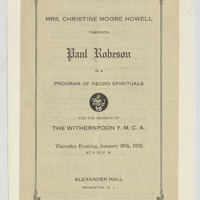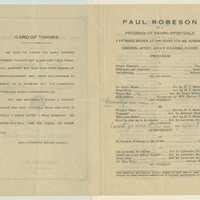Mrs. Christine Moore Howell presents Paul Robeson in a Program of Negro Spirituals for the Benefit of the Witherspoon Y.M.C.A. 1932 January 28.
Item
-
Title
-
Mrs. Christine Moore Howell presents Paul Robeson in a Program of Negro Spirituals for the Benefit of the Witherspoon Y.M.C.A. 1932 January 28.
-
Description
-
The January 1932 Paul Robeson concert program was hosted by the Witherspoon Y.M.C.A. It was Princeton’s all-Black YMCA branch that served as a social, recreational, educational, and civic hub for nearby Black neighborhoods through the 1930s. It occupied the building at (now) 102 Witherspoon Street (earlier locations at Jackson & Green/Witherspoon) and employed local Black leaders as directors by the 1920s, and is documented in Princeton archives and local histories (Hsp-Admin 2017). 
-
It’s important to understand the subtext in the CARD OF THANKS portion on Page 2 of the program. Mrs. Howell validated that attendee support was not wasted, despite numerous obstacles. She asserted that the audience was aiding a worthy cause; perhaps suggesting the political and governmental headwinds facing Mr. Robeson for continuing to speak his truth against social injustices.
Paul Robeson (1898 – 1976) was a Black American artist and activist whose life bridged scholarship, athletics, performance, and political engagement. Born in Princeton, NJ, he excelled academically and athletically, earning a scholarship to Rutgers University, where he won multiple varsity letters, was class valedictorian, and was inducted into Phi Beta Kappa.
After earning his LL.B. from Columbia University in 1923, Robeson briefly practiced law but left the profession in the face of racial discrimination in the legal field (Paul Robeson House & Museum 2018). He devoted himself instead to theater, concert performance, and film, attaining international acclaim for roles in The Emperor Jones, Othello, and the musical Show Boat, where his rendition of “Ol’ Man River” became a signature piece.
Robeson spoke out against racial injustice, colonialism, and war, aligning himself with progressive causes. His outspoken views led to surveillance, blacklisting, and the revocation of his U.S. passport during the McCarthy era, until its reinstatement in 1958 (Wikipedia contributors 2025f). In later years he suffered from health challenges, eventually withdrawing to Philadelphia, where he lived in relative seclusion until his death.
Robeson’s legacy endures in his recordings, writings, films, in the institutions that preserve his work.
Christine Moore Howell (1899–1972) was a pioneering beauty culturist, entrepreneur, and educator. Drawn to hair and makeup from an early age, she opened her first salon in Princeton, NJ in 1920. Through her company, Christine Cosmetics, Inc., she manufactured beauty products and, in 1935, became the first Black woman appointed to the New Jersey State Board of Cosmetology, where she eventually served as Chair (Ringer 1958).
A book author of Beauty Culture and Care of the Hair (1936), Howell was also a sought-after speaker, addressing audiences nationwide on cosmetology, grooming, and civic issues, including Black women’s political participation. Her work advanced professional standards in beauty culture while championing the education and empowerment of Black women.
-
Paul Robeson Biography
-
Rights
-
Rights assessment is your responsibility. This material is made available for noncommercial educational, scholarly, and/or charitable purposes. For other uses or for more information, please contact research@princetonhistory.org.
-
Creator
-
[Witherspoon YMCA]
-
Date
-
1928/01/28
-
Format
-
Text
-
Language
-
eng
-
Spatial Coverage
-
Princeton, NJ
-
Contributor
-
Historical Society of Princeton
-
Extent
-
2 pages
-
Identifier
-
MS936.858.2
-
Date Created
-
1932
-
Subject
-
Political activists
-
New Jersey--Princeton
-
Actors, Black
-
African American lawyers
-
African American singers
-
Beauty shops
-
Young Men's Christian associations--Buildings
 Mrs. Christine Moore Howell presents Paul Robeson in a Program of Negro Spirituals for the Benefit of the Witherspoon Y.M.C.A. 1932 January 28., p.1
Mrs. Christine Moore Howell presents Paul Robeson in a Program of Negro Spirituals for the Benefit of the Witherspoon Y.M.C.A. 1932 January 28., p.1 Mrs. Christine Moore Howell presents Paul Robeson in a Program of Negro Spirituals for the Benefit of the Witherspoon Y.M.C.A. 1932 January 28., p.2
Mrs. Christine Moore Howell presents Paul Robeson in a Program of Negro Spirituals for the Benefit of the Witherspoon Y.M.C.A. 1932 January 28., p.2

